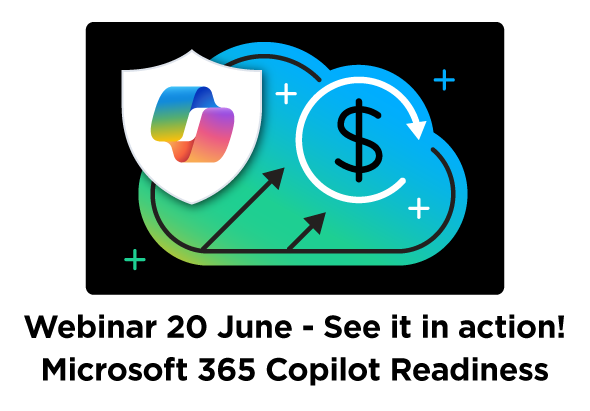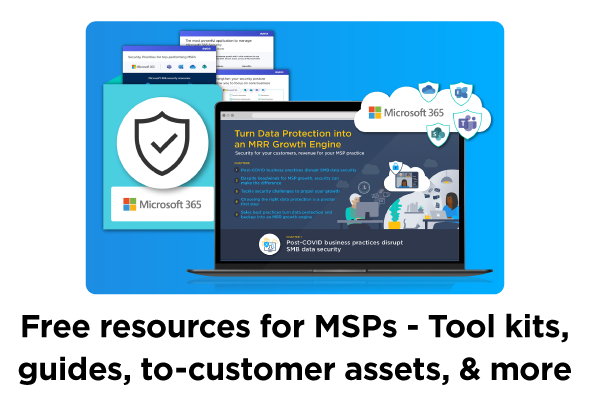Cloud Backup Assessment Results
Here are your Cloud Backup Assessment results. If you have any questions, please contact us through the form at the bottom of this page.

Backup solutions are essential to enterprises to support business continuity.
Threats, such as ransomware attacks, human error, and unforeseen disasters, can occur at any time and put data at risk. Data loss can be devastating for enterprises, resulting in:
- Expensive downtime
- Lost revenue
- Loss of shareholder value
- Damage to your reputation.
Cloud-based backup and recovery solutions provide a cost-effective, infinitely scalable way to protect valuable business data. If your Microsoft 365 productivity or collaboration information is impacted by ransomware, a natural disaster, or any malicious or accidental data loss, you will be able to easily search for, find, and restore business-critical files.

Cloud backup is recommended for most small businesses.
You may wonder whether your company is large enough or whether your data is significant enough to warrant purchasing a backup solution. Data backup is actually crucial for all businesses, regardless of size.
Data loss can be surprisingly punishing to small businesses, resulting in:
- Expensive downtime
- Lost revenue
- Damage to your reputation.
- Suspended operations while you recover
According to the National Cybersecurity Alliance, 60% of small businesses that suffered a major data loss closed within six months of the event. Your data is your company’s lifeblood and needs to be protected regardless of the sector you work in. A backup solution is not just for businesses that provide financial, legal, education, or professional services. It is for any business that has data, from retail and manufacturing to healthcare and non-profit, and anything in between.

Backups are often a requirement for regulatory compliance.
Regulations such as GDPR, PCI, and HIPAA, among others, were developed to ensure that firms use the most dependable means to protect all forms of sensitive data from accidental Compliance cannot be achieved unless a company handles data in accordance with the regulations.
Backups enable organizations to protect data from risks such as software or hardware failure, hacker attacks, or human error. Any of these issues could result in data loss, system failures, financial losses, and reputational harm.
Certain geographic locations also require backup data to be stored in local data centers. Compliance with many legal, industry, and governmental requirements dictate that corporations are legally obligated to restore personal data including Microsoft 365 data immediately in the event of data loss.
Having a reliable data backup strategy is a crucial step for compliance with regulations and achieving business continuity.

Cloud backup regulatory compliance can help build customer trust and loyalty.
Although your business may not be subject to data protection regulations today, the regulatory landscape is constantly changing. A backup solution can prepare you for compliance requirements that may go into effect in the future.
Regulations such as GDPR, PCI, and HIPAA, among others, were developed to ensure that firms use the most dependable means to protect all forms of sensitive data. Compliance cannot be achieved unless a company handles data in accordance with the regulations.
Certain geographic locations also require backup data to be stored in local data centers. Compliance with many legal, industry, and governmental requirements dictate that corporations are legally obligated to restore personal data including Microsoft 365 data immediately in the event of data loss.
Having a reliable data backup strategy is a crucial step for compliance with regulations and achieving business continuity.

Remote and hybrid work increase the need to back up modern collaboration tools
According to recent studies, nearly three quarters of workers want flexible work options to continue in the post-pandemic era. This has resulted in a 10x increase in the use of collaboration tools like Microsoft Teams.
With a distributed workforce comes an added reliance on online tools that allow staff to be productive no matter where they may be. Rather than working with business documents that were once protected behind a firewall in an on-premises environment, sensitive assets are now more widely dispersed — shared over email, within Teams, and on SharePoint.
When employees work remotely, they rarely have the same level of device, network, or physical security as when they are in the office. This makes their Microsoft 356 data more susceptible to security breaches. A comprehensible cloud backup solution ensures that Microsoft 365 data can always be recovered irrespective of work environments.

Even without remote workers, you may still have distributed data that requires backup.
The reality is that even if your company does not permit remote or hybrid work, your customers and partners likely do. Collaborating with these external stakeholders creates records and data assets that will likely live beyond the protection of your internal, firewalled IT environment.
- A cloud backup solution continuously saves a copy of the data even as it changes. This ensures you can restore any file, any version, any time.
- It provides peace of mind that you can recover from ransomware, hardware failure, and human error in an instant.

Data archiving serves a different purpose than data backup
Archiving data isn’t the same as backing it up, though the two terms are frequently used interchangeably and appear on the surface to be practically equivalent. However, they perform two entirely different functions.
Data backup
- Backup is for recovery. The primary purposed of a backup is create copies of your current and active datathat can be used to recover operations if your data is lost or corrupted.
- Data may be backed up as regularly as daily or even multiple times per day.
- Leading cloud backup services like SkyKick Cloud Backup can back up and restore data across Microsoft 365, including Exchange Online, OneDrive for Business, SharePoint, and Microsoft Teams.
- The principal goal of backing up files is to be able to restore your data to a previous point in time (i.e. before a ransomware attack occurred).
Data archive
- Archiving does not create a separate copy of data. Rather, it stores data for legal, compliance, and/or business purposes.
- Archiving is designed for long-term preservation and discovery of data, not the rapid recovery of lost data required for day-to-day business functions.
- Many archiving solutions only cover email data, not business critical data in OneDrive for Business, SharePoint, or Microsoft Teams.
- Data is put into an archive once and is not changed thereafter, whereas a backup solution creates recoverable copies of data as it changes.
Many companies require both archiving and backup. However, for many companies, a backup solution is sufficient.

Archiving alone likely isn’t sufficient.
Archiving data isn’t the same as backing it up. And archiving likely isn’t sufficient in the event of a major data event. Let’s explain. Data backup and data archive are two terms that are frequently used interchangeably and appear to be practically equivalent on the surface. However, they perform two entirely different functions.
Data backup
- Backup is for recovery. The primary purposed of a backup is create copies of your current and active datathat can be used to recover operations if your data is lost or corrupted.
- Data may be backed up as regularly as daily or even multiple times per day.
- Leading cloud backup services like SkyKick Cloud Backup can back up and restore data across Microsoft 365, including Exchange Online, OneDrive for Business, SharePoint, and Microsoft Teams.
- The principal goal of backing up files is to be able to restore your data to a previous point in time (i.e. before a ransomware attack occurred).
Data archive
- Archiving does not create a separate copy of data. Rather, it stores data for legal, compliance, and/or business purposes.
- Archiving is designed for long-term preservation and discovery of data, not the rapid recovery of lost data required for day-to-day business functions.
- Many archiving solutions only cover email data, not business critical data in OneDrive for Business, SharePoint, or Microsoft Teams.
- Data is put into an archive once and is not changed thereafter, whereas a backup solution creates recoverable copies of data as it changes.
Many companies require both archiving and backup. However, for many companies, a backup solution is sufficient.

Backing up data is a critical component of every business continuity plan.
Microsoft strongly recommends backup for Microsoft 365 data.
Microsoft 365 has over 50 million users worldwide. If you’re like most, your business likely creates and stores important information like customer, employee, and financial records, conversations, and intellectual property in Microsoft 365 apps. What you may not be aware of is:
- Microsoft does not back up your data by default.
- Most of your data is only protected for 30-90 days and some data is even automatically deleted after 14 days.
- Microsoft’s own terms and conditions state, “We strongly advise you to make regular back-up copies of Your Content. Microsoft can’t be held responsible for Your Content or the material others upload, store or share using our Services.”

Backing up data is a critical component of every business continuity plan.
Some of the advantages of backing up data to the cloud include the ability to:
- Prevent data loss
- Restore damaged, erased, or corrupted data
- Ensure business continuity in the case of an emergency (ransomware attack, natural disaster, power outage, human error)
- Prevent ransomware payments by enabling the rapid recovery of non-encrypted data.
No matter what business productivity tools your business uses, a cloud backup solution can help you recover quickly from data loss.
Common causes of data loss include:
- Natural disasters or fires that harm devices
- Hard drive failures
- Cyber-attacks that encrypt data
- Software corruption or bugs
- Human error
Backups can restore operations in a timely manner if one of these emergencies occurs. This avoids financial losses that could endanger a company’s viability. Microsoft strongly recommends backup for Microsoft 365 data.
SkyKick Cloud Backup is the “Undo Button” for lost, stolen, corrupt or mistakenly deleted Microsoft 365 data.
With SkyKick you can protect the data that drives your business. It’s the complete cloud backup and stress-free recovery solution for data in Exchange Online, SharePoint for Business, OneDrive for Business and Microsoft Teams.
Microsoft backs up its platforms from disaster — but not the individual user and customer data you rely on. If your business suffers a ransomware attack or human error, your data could be gone forever. Get peace of mind and ensure business continuity with SkyKick, the only true set-it-and-forget-it cloud backup solution for Microsoft 365.
- Live in minutes.
- Limitless storage.
- Transparent, predictable pricing.

